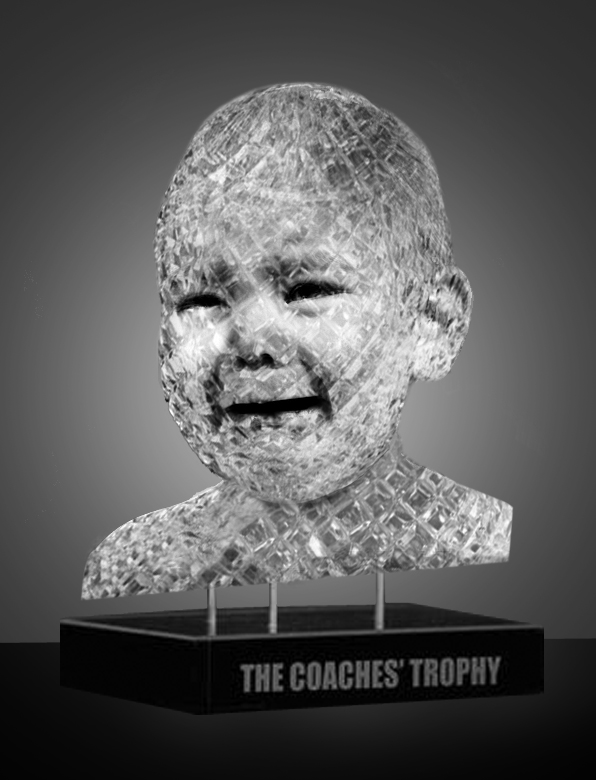- Thread starter
- #1
batchaps4me
Trolley conductor in Mr. Rogers' neighborhood.
UCF not the first school to call itself national champion
t celebrates after UCF defeated Auburn to finish a 13-0 season. Kevin C. Cox/Getty Images
11:13 PM ET
Someone check college football's outrage meter. This can't be right.
As the all-SEC national championship game approaches, and with it the chance to claim all the Southern fried bragging rights, the sport's arrows are pointed toward ... UCF?
Whether it's the new Twitter name (2017 National Champions), the banner to be raised, the parade to be held or the bonuses to be paid to coaches now working for Nebraska, UCF has gone all in on its national championship campaign. From the moment Scott Frost went off on the CFP system after UCF completed a perfect 13-0 season, the reaction has been sharp and swift, as many have gone out of their way to discredit UCF's title claim. Plenty of charged words have been used to describe what UCF is doing.
Here's another word: tradition.
It's a proud tradition for college programs to claim national championships, even if virtually no one outside of their campuses acknowledges them. The sport's history books are filled with teams writing their own chapters.
Odds are, those eviscerating UCF root for a team that claims a questionable championship or four. Good luck finding a sport with more haziness surrounding its national championship. The Knights are merely the latest to crown themselves.
Is their title any less legitimate than the one claimed by Alabama in 1941? The Tide went 9-2 and finished third in the SEC and ranked No. 20 in the final AP poll, which was compiled before the bowl games. Even though Minnesota is the acknowledged national champion that season, Alabama claims a title because something called the Houlgate System selected the Tide as the top team.
Alabama is the worst violator of the we're-champs-cause-we-said-so tradition. The Tide claim 16 national titles, but the NCAA only acknowledges 14. Both Alabama and Notre Dame claim the 1973 national title, but the UPI Coaches' Poll awarded its title to the Tide before the Sugar Bowl, where they lost to, yep, Notre Dame. The next year, the poll began naming a top team after the postseason.
Imagine that.
Alabama's opponent Monday night, Georgia, claims the national title in 1942, even though Ohio State finished No. 1 in the final pre-bowl AP poll and earned the title from most of the awarding outlets. Georgia has two claimed championships and three unclaimed.
Claiming titles isn't only a practice of the distant past. Nick Saban won his first national title when his LSU team beat Oklahoma in the BCS championship game after the 2003 season. But don't tell that to USC. The Trojans claim a national title that year after being voted No. 1 in the final AP poll.
Months after that final bowl, USC became a national champion again, without even playing a down. That's because the school began claiming the 1939 national title after conducting "significant research," then-athletic director Mike Garrett said at the time. Although Texas A&M had topped most of the final polls, taken before the bowl season, USC's Rose Bowl win over Tennessee, which hadn't allowed a single point all season, gave the Trojans the nod from the Dickinson system, a formula conceived by a University of Illinois economics professor that awarded the national title from 1926 to 1940.
Give UCF credit for this: At least the school didn't waste any time staking its title claim. In August 2012, Minnesota announced it had won a seventh national title, only 108 years after the fact. Minnesota claimed the 1904 title after an athletic department staffer realized the NCAA acknowledged the Gophers as champs that year, even though the university had not.
The NCAA also lists Michigan and Penn as national champions for 1904, and the debate between them comes down to, you guessed it, scheduling. Even though Minnesota opened its season against Twin Cities Central High School, played both Dakotas and another high school, and didn't leave its home field until Nov. 12, the Gophers' schedule strength trumped Michigan's. Minnesota beat Nebraska, Wisconsin, Northwestern and Iowa down the stretch, while Penn didn't allow a single point.
If UCF needs help for its potentially anticlimactic banner-raising ceremony, it should call Oklahoma State, which unveiled the 1945 national championship sign at Boone Pickens Stadium in July. A panel of coaches from the American Football Coaches Association had awarded the 1945 title to the Oklahoma A&M Aggies, who became the Cowboys of Oklahoma State in the 1950s.
Confused? You're not alone.
Go ahead and rage against UCF if you'd like. Call the Knights' championship celebration fake or petty or annoying. Don't pretend like this is unprecedented.
So raise the banner, UCF. Hold the parade. Pay the coaches.
In college football, claiming titles is a tradition unlike any other.
t celebrates after UCF defeated Auburn to finish a 13-0 season. Kevin C. Cox/Getty Images
11:13 PM ET
-

Adam RittenbergESPN Staff Writer
Someone check college football's outrage meter. This can't be right.
As the all-SEC national championship game approaches, and with it the chance to claim all the Southern fried bragging rights, the sport's arrows are pointed toward ... UCF?
Whether it's the new Twitter name (2017 National Champions), the banner to be raised, the parade to be held or the bonuses to be paid to coaches now working for Nebraska, UCF has gone all in on its national championship campaign. From the moment Scott Frost went off on the CFP system after UCF completed a perfect 13-0 season, the reaction has been sharp and swift, as many have gone out of their way to discredit UCF's title claim. Plenty of charged words have been used to describe what UCF is doing.
Here's another word: tradition.
It's a proud tradition for college programs to claim national championships, even if virtually no one outside of their campuses acknowledges them. The sport's history books are filled with teams writing their own chapters.
Odds are, those eviscerating UCF root for a team that claims a questionable championship or four. Good luck finding a sport with more haziness surrounding its national championship. The Knights are merely the latest to crown themselves.
Is their title any less legitimate than the one claimed by Alabama in 1941? The Tide went 9-2 and finished third in the SEC and ranked No. 20 in the final AP poll, which was compiled before the bowl games. Even though Minnesota is the acknowledged national champion that season, Alabama claims a title because something called the Houlgate System selected the Tide as the top team.
Alabama is the worst violator of the we're-champs-cause-we-said-so tradition. The Tide claim 16 national titles, but the NCAA only acknowledges 14. Both Alabama and Notre Dame claim the 1973 national title, but the UPI Coaches' Poll awarded its title to the Tide before the Sugar Bowl, where they lost to, yep, Notre Dame. The next year, the poll began naming a top team after the postseason.
Imagine that.
Alabama's opponent Monday night, Georgia, claims the national title in 1942, even though Ohio State finished No. 1 in the final pre-bowl AP poll and earned the title from most of the awarding outlets. Georgia has two claimed championships and three unclaimed.
Claiming titles isn't only a practice of the distant past. Nick Saban won his first national title when his LSU team beat Oklahoma in the BCS championship game after the 2003 season. But don't tell that to USC. The Trojans claim a national title that year after being voted No. 1 in the final AP poll.
Months after that final bowl, USC became a national champion again, without even playing a down. That's because the school began claiming the 1939 national title after conducting "significant research," then-athletic director Mike Garrett said at the time. Although Texas A&M had topped most of the final polls, taken before the bowl season, USC's Rose Bowl win over Tennessee, which hadn't allowed a single point all season, gave the Trojans the nod from the Dickinson system, a formula conceived by a University of Illinois economics professor that awarded the national title from 1926 to 1940.
Give UCF credit for this: At least the school didn't waste any time staking its title claim. In August 2012, Minnesota announced it had won a seventh national title, only 108 years after the fact. Minnesota claimed the 1904 title after an athletic department staffer realized the NCAA acknowledged the Gophers as champs that year, even though the university had not.
The NCAA also lists Michigan and Penn as national champions for 1904, and the debate between them comes down to, you guessed it, scheduling. Even though Minnesota opened its season against Twin Cities Central High School, played both Dakotas and another high school, and didn't leave its home field until Nov. 12, the Gophers' schedule strength trumped Michigan's. Minnesota beat Nebraska, Wisconsin, Northwestern and Iowa down the stretch, while Penn didn't allow a single point.
If UCF needs help for its potentially anticlimactic banner-raising ceremony, it should call Oklahoma State, which unveiled the 1945 national championship sign at Boone Pickens Stadium in July. A panel of coaches from the American Football Coaches Association had awarded the 1945 title to the Oklahoma A&M Aggies, who became the Cowboys of Oklahoma State in the 1950s.
Confused? You're not alone.
Go ahead and rage against UCF if you'd like. Call the Knights' championship celebration fake or petty or annoying. Don't pretend like this is unprecedented.
So raise the banner, UCF. Hold the parade. Pay the coaches.
In college football, claiming titles is a tradition unlike any other.






























